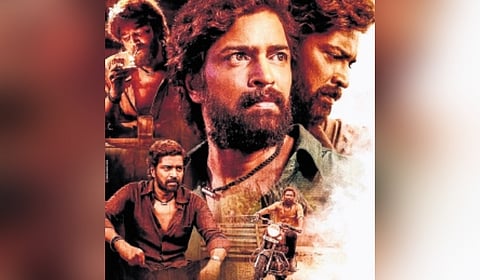

Anyone actively following Indian cinema for the past couple of years knows that ‘anti-hero’ is the new trend among protagonists. They behave in unconventional, often morally dubious manners, and yet there’s an aspirational coolness to their portrayal. In Bachhala Malli, we get a stylish action sequence with Malli (Allari Naresh) early on, showcasing him in all the swagger that a hero is expected to carry.
And yet when the title credit drops, it’s after a visual of Malli being literally down in the dumps. For all the bravado he possesses, Malli is ultimately a wronged man with a tragic past — Director Subba Mangadevvi stays true to this brief for a large part of his film.
On the surface, Bachhala Malli is a formulaic drama, riddled with familiar devices like class-barrier, business rivalry, dysfunctional families, et al. However, Subba, working with a screenplay by Vipparthi Madhu, weaves in plenty of ideas that lend a sense of emotional novelty to the film.
In his late teens, Malli finds himself deserted by his biological father, and slowly lets himself be consumed by abandonment issues. And while he tries to redeem himself many years later, Malli never really succeeds in overcoming his trauma.
It’s not just the trauma from the days gone by that haunts him, but also his reputation of a man brimming with evil. Even when Malli attempts to establish his own business after deciding to turn a new leaf, his actions continue to be misunderstood, landing him in altercations with his village folk time and again, for various reasons.
Although the film never overtly mentions the caste hierarchy, there is a clear dynamic where Malli is established as the underdog while Ganapathi Raju (Achyuth Kumar) is the local power-wielding baron who doesn’t tolerate any kind of competition, let alone from an ‘outsider’ like Malli.
The transformation in Malli’s life arrives after he meets Kaveri (a passable Amritha Iyer). The etching of this love story makes you uncomfortable at first, with its Sethu-like dynamics between the two lovers. However, the relationship between Malli and Kaveri eventually tugs at your heartstrings with a few tender moments, like the one where a drunk Malli sews Kaveri’s dress that gets torn at a wedding.
In the second half as well, there’s a poignant moment where Malli has an interaction with a sex-worker while he gleefully talks to her about his marriage plans, while the woman sincerely listens to him. Within a few moments, we see their equation shift from one between a client and a seller to that of two old friends.
It doesn’t take long for the audience to realise that underneath the rugged exterior of vices and machismo, Malli is a good-hearted man, merely riddled with emotional baggage.
And while the writers struggle a bit to neatly tie in all the conflict points of his story into a smooth-running screenplay, Malli remains a character we root for. So when the going gets rosier with Kaveri, and everything looks promising, we know it’s only a matter of time before things turn dark for Malli.
The second half of Bachhala Malli is a hit-and-miss. While you appreciate the writer’s intent to merge past and present to essentially tell a story about trauma and healing, the narrative isn’t adequately coherent or tonally consistent. Ankith Koyya makes a staggering entry late into the movie as Ramana, but his character gradually gets lost in the maze. Usually, we complain about movies being too long.
However, Bachhala Malli could have actually benefited from a little more screen-time being devoted to the dynamics between Malli and Ganapathi Raju, or Malli’s relationship with his mother (Rohini). In its haste to circle back to the tragic turnaround events in Malli’s life, the screenplay fails in establishing a convincing base for all its conflicts. The world around Malli has a lot of drama, but not enough depth.
And yet, there are plenty of things here that deserve appreciation. Vishal Chandrasekhar’s songs and background score add a lot of value to the film. The cinematography is very impressive in places. However, what’s most impressive is how Bachhala Malli treats the characters on the sidelines.
It’s the supporting cast members like Hari Teja, Rao Ramesh and Rohini who leave great impact with a handful but powerful moments centred on them. Bachhala Malli is largely focused on its titular protagonist (with a very impressive Allari Naresh), and yet what connects the audiences to Malli is the bond he shares with everyone else around him, be it his niece Rajyam (Hari Teja), brother-in-law or his mother.
In a touching moment towards the end, as Malli saunters out of a hospital in a critical state, he stops to look at Rajyam and her husband — fast asleep, and yet sitting by his side, just like every other time he needed them.
The biggest tragedy of Malli’s life is how he fell down a path of self-destruction despite having such caring souls around him, and director Subbu Mangadevvi tenderly underlines his tragedy in this moment, like a few others. Bachhala Malli is a conventional yet watchable fare for little moments like this.
Cast: Allari Naresh, Amritha Iyer, Rao Ramesh, Rohini, Ankith Koyya
Director: Subbu Mangadevvi